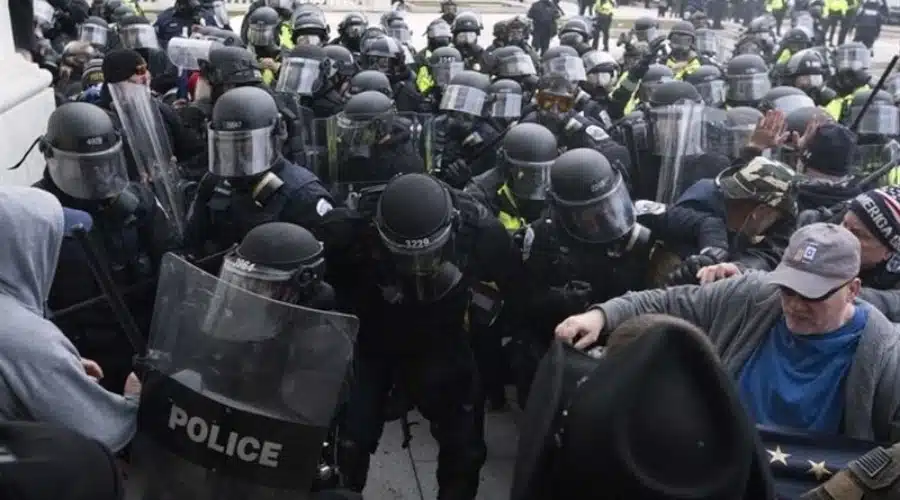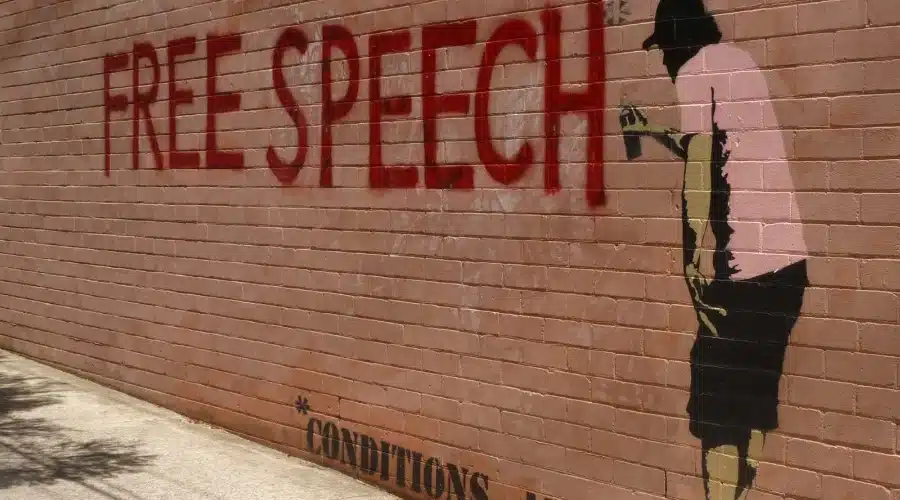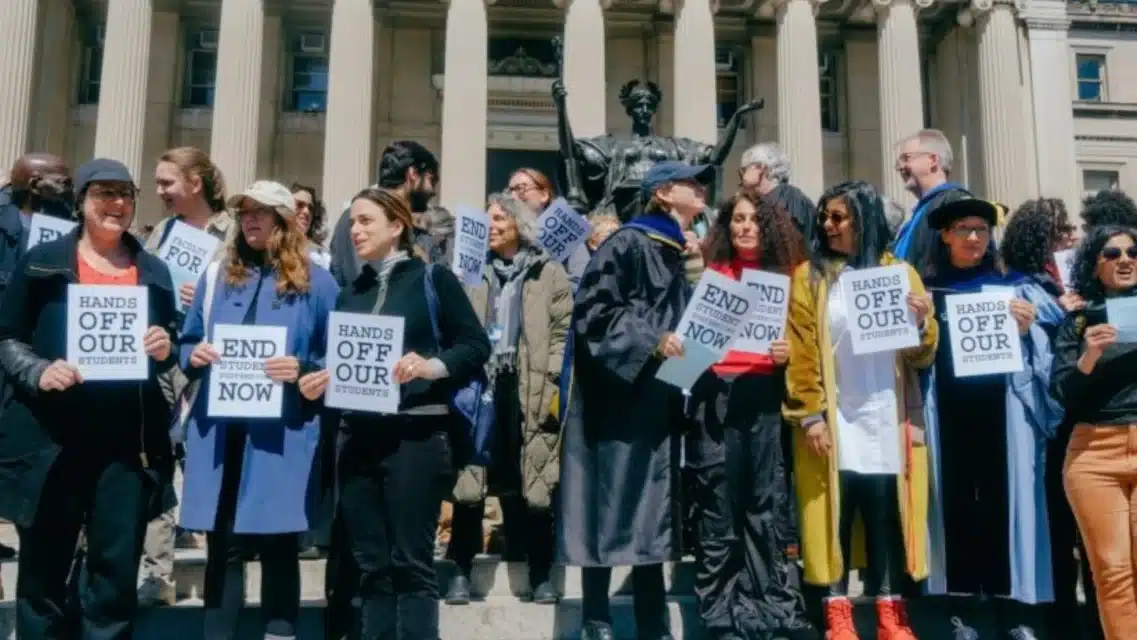A few days ago, I came across an intriguing yet frustrating story that triggered my thoughts about freedom. Rather than pointing fingers, I wanted to explore the philosophical dimensions.
It began with a professor, hands trembling slightly as he hit “send” on his resignation letter. After decades at the university he loved, he was walking away. Not out of defeat, but defiance.
For months, the campus had been torn apart by controversy. The leadership had drawn their line in the sand—an ideological boundary that put image and governance above the free exchange of ideas that had once defined the institution. “I can no longer be associated with this institution,” he wrote in his final statement, heart heavy but conscience clear.
His story isn't unique, but it raises questions that echo far beyond one campus: What does it truly mean to be free? Can we really speak our minds without fear, even as our institutions enforce rules? Do free expression and effective governance naturally support each other, or are they destined to clash?
This resignation—born from a collision of values—invites us to examine where freedom of speech meets the freedom to govern. Are these ideals partners in building civilization, or adversaries locked in an endless tug-of-war? As we explore this tension, we move beyond politics into philosophy, history, and what it means to live in a free society.

What Does Freedom Really Mean to Me?
Freedom. I've always found the word itself carries an almost sacred weight. But what does freedom truly mean in my life and yours?
At its core, freedom means the absence of restraints—the ability to be ourselves, think our own thoughts, make our own choices. It's the cry that has launched revolutions: “Give me liberty, or give me death!” Patrick Henry's bold declaration speaks to something I feel in my bones—that liberty is worth any cost.
Freedom should mean the chance to chart our own destiny—to live authentically, seek our own answers, and more importantly, to ask our own questions, and speak our minds without fear. It's an intrinsic human yearning, intertwined with our dignity and identity.
Yet, I've learned freedom isn't as simple as “no rules at all.” Absolute freedom—each of us doing whatever we please with zero consequences—would quickly descend into chaos. As a friend once told me, “Freedom doesn't mean the absence of all responsibility or restraint”. Every society, even the freest, places some limits on individual behaviour so we don't harm each other.
True freedom, I believe, exists in balance: enough liberty for each person to thrive and express themselves, enough structure for society to function and protect its members. Freedom is both privilege and responsibility. Just as I gradually gave my children more freedom as they showed maturity, society entrusts citizens with freedom, expecting we'll wield it with regard for others.
So, when I think about freedom of speech, I wonder: how far does that privilege extend, and what responsibilities come with it? Does freedom of speech mean I can say anything without consequences? Or are there lines that, when crossed, mean speech is no longer protected? These questions become thorny where governance enters—because governance sets rules, and rules, by definition, constrain certain freedoms.
Freedom of Speech vs. Governance - an Inevitable Clash
Socrates, one of the most quoted figures, was, in his time, condemned for his outspoken ideas. He drank hemlock as his disciples watched. His fate in ancient Athens reminds me that speaking freely can carry steep consequences when it challenges power. Is freedom of speech absolute, or does governance require curtailing some speech?
Athens prided itself on being a free, democratic city where citizens could debate openly. Yet even this early democracy couldn't tolerate certain speech. Socrates spent his days questioning the city's leaders and gods—exercising what I'd call free inquiry. For this “crime” of speaking his mind, he was tried and sentenced to death.
The charge was “corrupting the youth” and impiety, but essentially, Socrates was executed for asking uncomfortable questions of those in power. The very city that extolled freedom couldn't handle a thinker who pushed the boundaries of acceptable ideas. In his fate, I see that the freedom to govern (to enforce the city's moral laws) directly clashed with an individual's freedom to speak truth as he saw it.
This tension isn't an anomaly; it runs throughout history. During World War I, even the United States passed the Sedition Act of 1918, making it illegal to voice opinions that cast the government or war effort in a negative light. Under this law, thousands of citizens—including labour leader Eugene Debs—were imprisoned simply for speaking against the war. The government, governing a nation at war, decided it couldn't afford certain kinds of speech.
To authorities, these voices threatened national unity and security. To the speakers and their supporters, the government had trampled the very liberty it claimed to protect. Again, I see freedom of speech colliding with the imperatives of governance. The state's power asserted itself by muzzling dissent, revealing how fragile free expression becomes under the weight of crisis.
Why does this clash occur repeatedly? Perhaps because speech is power. Words can inspire, unite, or incite; they can just as easily undermine authority or disrupt order. A government—or any governing body, like my university's administration—naturally seeks stability and the ability to implement policies. When words threaten that stability, the instinct is often to restrict those words.
Even leaders with the best intentions may feel certain ideas are so dangerous or reprehensible they must be ruled out-of-bounds. Free speech, taken to its fullest extent, means even odious, unpopular, and shocking opinions get aired. Governance, taken to its fullest extent, means maintaining a vision of order and shared values—sometimes by drawing lines on what can be said or done.
It's no surprise, then, that the freedom to speak and the freedom to govern will sometimes clash. The question I struggle with: must it always be so? Or can we find a way for these principles to coexist without one crushing the other?

Drawing Lines in the Sand with Blood
Many institutions loudly declare their commitment to free speech—universities, governments, media platforms—yet in the next breath, they may enforce written or unwritten ideological lines. I've wondered: is it possible to truly protect free expression while also saying “but not that opinion”?
The professor's resignation from the opening story shows how complicated this is in practice. I believed in the university as a haven for open discourse, where ideas stand or fall on their merits. But I watched as, from my perspective, the institution started prioritizing governance over free speech.
What did that mean for me? It meant the university's leadership made decisions to appease one loud faction of the community at the expense of another's voice. A colleague with extreme views was given a prominent platform; students and staff who disagreed felt increasingly marginalized. I saw an ideological agenda taking hold, under the guise of administrative necessity and academic freedom.
The institution claimed it was merely fostering dialogue—yet only certain viewpoints seemed officially sanctioned. To me, the school's professed neutrality was a sham; by enforcing an orthodoxy, it had betrayed genuine free speech.
This scenario isn't isolated. I've seen corporations tell employees, “We value open feedback,” but then implicitly punish those who criticize the company's direction. Or governments that uphold free speech constitutionally, yet quietly surveil dissenters who speak too harshly against leadership. The gulf between principle and practice can be wide.
An institution—whether my university, a company, or a state—often walks a tightrope, trying to maintain an image of openness while controlling stability and public perception. They might say, “You can say anything you want... except that”. But once that exception exists, free speech is no longer absolute; it's conditional.
Can such an institution honestly claim to champion free speech? Perhaps it can aspire to, but the moment ideological litmus tests creep in, the commitment is compromised. A university can't pride itself on being a marketplace of ideas if certain stalls in the market are banned. A government cannot call itself free when it dictates which criticisms are permissible.
Yet, defenders of these institutions would argue some ideas are beyond the pale—too dangerous, false, or harmful to be tolerated. They might ask: Should a democracy allow propaganda by those who would destroy democracy? Or must a university host a speaker whose views deeply offend part of its student body?
These are fair questions, underscoring that complete neutrality on speech can feel morally difficult in extreme cases. I find myself in a paradox. To protect free speech, an institution must sometimes protect even speech it dislikes. But to uphold its values or govern effectively, that same institution might feel compelled to shut down speech that undermines those values.
My plight exemplified this paradox: I felt the university was protecting the wrong speech (in my case, speech I saw as hateful or extremist) while silencing by exclusion the perspective I shared. Meanwhile, administrators believed they were being inclusive and open—governing a diverse campus—even if it meant one side felt betrayed.
Who was right? Possibly both, possibly neither. What's clear to me is that when an institution starts drawing lines based on ideology, it risks hypocrisy: claiming to defend freedom, while effectively fencing it in.
Power and the Selective Shield of Speech
How does power influence whose speech is protected and whose is restricted? In my experience, power often decides who gets the megaphone and who gets the muzzle. Throughout history, those in authority have tended to protect speech that supports their position and smother speech that threatens it. This isn't always done with malice; sometimes leaders truly believe they're acting for the greater good. But I've seen the pattern repeatedly.
A ruler facing dissent labels critics as dangerous subversives. The dissenters champion free speech as their shield. Each side paints the other's words as illegitimate.
During the Cold War in America, leftist voices accused of communist sympathies were blacklisted in academia and Hollywood—an effort led by people who believed they were protecting the nation from dangerous ideas. Meanwhile, decades later, speakers voicing conservative opinions sometimes find themselves shouted down on liberal campuses, by people convinced they're protecting the community from harm.
In both cases, a form of power (whether government committees or social majority) influenced whose voice was heard and whose was suppressed. I've come to understand that power doesn't just reside in government. It can be social, economic, institutional. A tech billionaire who owns a social media platform can effectively decide which views spread widely—a private power shaping public speech. A student mob can wield power to intimidate a professor from presenting an unpopular theory.
The dynamics of power mean that ostensibly neutral rules (“no hate speech” or “no disinformation”) might be enforced in ways that favour one group's definition of hate or truth. As one free-expression advocate noted, once you grant an authority the right to censor, “the power to censor always invites abuse and never stays cabined”. In other words, censorship might start with noble intentions but often expands. Today it censors your opponent; tomorrow, that same tool can be turned against you.
I saw this in the debate over disinformation on campuses. Some universities, under pressure to combat hate and harassment, considered rules to punish certain extreme speech. But observers from across the political spectrum grew wary: Which voices would actually be silenced? If a university president can ban speech calling for violence, what stops them from banning criticism of the government or, conversely, harsh criticism of a foreign movement they sympathize with?
When power enters the equation, the selectivity becomes clear. Often it's the dissenting voice, the minority viewpoint, or the politically inconvenient speech that gets restricted first. The voices of the powerful—the majority, the administration, the mainstream media—tend to be well-protected (they, after all, are doing the protecting).
This doesn't mean the powerful never get censored; sometimes they do, when a different power centre overrules them. But it means any claim of “we support free speech” should be scrutinized for who holds power and who might be silenced in practice. True commitment to free speech is tested not when the popular person speaks, but when the pariah does.

Freedom and Consequences or Fear and Freedom
A final puzzle in this debate that troubles me: Is the absence of consequence the same as true freedom? We often hear, “You have freedom of speech, but not freedom from consequences.” On the surface, that's true—if I insult my boss, I might lose my job; if I spread lies about someone, I might get sued for defamation. Consequences are society's way of saying speech matters.
But taken to an extreme, this notion can undermine the spirit of free speech. If speaking my mind on a controversial issue guarantees I'll be socially ostracized or professionally blacklisted, how free am I, really, to speak? Legally, the government might not jail me, yet I might self-censor out of fear. The consequence doesn't have to be formal; it can be the angry mob on social media, the loss of friends, or, as in my case, an unbearable work environment.
Freedom of speech in theory means little if in reality only a narrow range of views can be voiced without ruinous fallout. To be sure, consequences can also mean accountability. Truly free speech doesn't shield me from criticism or debate. If I say something, others are equally free to call me out, to protest, to present counterarguments. That kind of consequence is integral to healthy discourse—it's exactly how the marketplace of ideas should work. Bad ideas get rebutted by better ideas, not by silence.
However, when consequences veer into punishment rather than rebuttal, we've stepped away from dialogue and into coercion. There's a line between social disagreement and social punishment. Losing an argument is a fair consequence; losing my livelihood because of my speech is a far more serious penalty. The latter casts a long shadow over the freedom to speak one's mind.
I think of whistleblowers who expose wrongdoing. In theory, we praise their courage and the principle of truth-telling. In practice, they often face devastating consequences: firing, lawsuits, even exile or imprisonment. Does this reality promote a culture of free expression, or deter it?
When someone famous says something offensive and faces public backlash, some cheer it as society's way of saying “those views aren't welcome.” But I worry: if the backlash aims not to debate but to punish and banish, it teaches everyone else to stay in line. The absence of official censorship can coexist with a climate of fear that chills speech just as effectively.
So, is true freedom the absence of any consequence? Not exactly—no society can promise every utterance will be met with applause or indifference. Yet, true freedom does require an absence of unreasonable consequences. It means speaking my piece, especially on matters of conscience or truth, won't destroy my life. It means institutions don't retaliate against dissent. It means power brokers don't wield their clout to silence critics, at least not without pushback.
In short, a culture of free speech thrives when people feel safe to voice ideas without dread of what will follow. When that safety vanishes, freedom becomes a hollow slogan.
Where I Draw the Boundaries of Freedom
Freedom of speech and the freedom to govern will always exist in tension. Perhaps that's inevitable—after all, my freedom can be another's disruption. But that tension can be healthy, even productive, if we handle it wisely. It forces us to continually negotiate our social contract: to ask Where do we draw the line? and Who gets to draw it?
My principled stand and the questions it stirred are a reminder that this negotiation is ongoing. A society that values both robust debate and effective governance must accept a certain amount of discomfort. True freedom will challenge power; it will make leaders squirm and institutions uncomfortable at times. And governance, if done in the spirit of liberty, will exercise restraint, using its power sparingly to curb only the most egregious harms, not mere inconveniences or unpopular opinions.
I often ask myself: would I have the courage to speak freely if I knew it would cost my career? Do we as citizens encourage a culture that prefers polite silence over difficult truths? The answers reveal much about where the boundaries of freedom lie in practice.
If too many people feel speaking their mind isn't worth the repercussions, freedom of speech has already eroded without a single law being passed. Conversely, if people can voice dissent and still feel respected and secure, liberty lives in that community.
In the end, perhaps freedom is less a clear-cut state and more a constant choice—a balance we must continually calibrate. Every generation, every institution, and every individual, faces the question: when speech and authority clash, which do we privilege, and why? There may not be easy answers, but the act of asking is vital.
As George Orwell famously observed, “If liberty means anything at all, it means the right to tell people what they do not want to hear”. That quote cuts to the heart of the matter: freedom isn't truly tested when we all agree; it's tested when someone speaks up with a message that unsettles us. At that moment, do we shut them up, or do we allow the conversation to continue? Our answer to that question defines the real boundaries of our freedom.
In our polarized world of powerful institutions, it's tempting to favour governance at the expense of speech, or speech at the expense of governance. But the challenge—and my hope—is to ensure these two principles keep each other in check. We must remember that without free speech, governance loses its compass, and without governance, speech alone cannot build a society.
The goal, then, is not to choose one freedom over the other, but to recognize that each requires the other's presence, and each must be carefully guarded from the other's excesses. Only by doing so can we inch closer to a society that is both free and just—where truth can be spoken to power, and power, in turn, truly serves the people.



